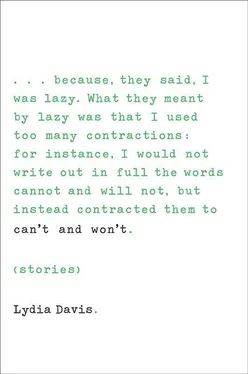I have to say that once the class is under way, the tension is not nearly as bad as during the hours leading up to it and particularly those last ten or twenty minutes just before it. The worst moment of all is the last moment, in my office, in which I get up from my chair, pick up my briefcase, and open the office door. Even five minutes, the five minutes remaining before I have to walk out of my office, are enough to give me a little feeling of protection, although that five minutes is almost too short a period of time to be of any use. But ten minutes is certainly long enough to protect me from that last minute.
I should know by now that once it begins, the hour itself will not be as bad as those ten or twenty minutes before it, and especially that last minute. If I really knew that the hour itself would not be as bad, then I wouldn’t be so afraid of it, and then of course those ten or twenty minutes beforehand would not be so bad. But there seems to be no way, yet, to convince myself of that. And, of course, sometimes it really is very bad.
Once, for instance, the class discussion got out of hand and offensive remarks were made by some of the students against certain groups of people, remarks which, since I did not know how to stop them quickly, may have appeared to have been made with my approval or even encouragement. Some of the other students, and I myself, became increasingly uncomfortable as the discussion continued. A more adept teacher could have broadened the discussion and rescued it, for instance by turning it into a lesson on the subject of the dangers of generalizing versus its usefulness. But I was not able to think of any way to do that right there on the spot, and the class ended with a bad feeling. Later, at home, I had some good and smart things to say that would have helped, but it was too late. I dreaded the next class and the chill that would pervade it. And I was not mistaken about the next class.
It is not often that the discussion goes in an unfortunate direction. More often there are just moments of awkwardness. Sometimes I hesitate while speaking, for instance, not because I am about to seize upon the perfect phrase or image, but because I have lost my train of thought and need to find some conclusion for my remark that will make sense. When I hesitate, the students become particularly riveted. They are far more interested when I grope for what to say next than they are when I am speaking on and on smoothly. Then, the more intently they watch me, waiting to see what I will say next, the more I am at a loss for what to say. I am afraid of becoming completely paralyzed. I must playact, and hide the fact that I am nearly paralyzed, and push myself on to some conclusion, at least a temporary one. Then they lose interest.
But what I dread in the classroom is not just the bad moment that I can’t rescue or the many awkward moments when I feel inadequate. It is something larger. I do not want to be the focus of attention of a large group of students who are waiting to see what I will do or say next. It is such an uneven match. There are so many on one side, in rows, staring at just one alone in front of them. My very face seems to change. It becomes more vulnerable, because it is not looked at charitably, as it would be by a friend or an acquaintance, or even a person on the other side of a counter from me in a store or a bank, but critically, as a sort of foreign object. The more bored the students are, the more my face and body become foreign objects to be examined critically. I know this because I have been a student myself.
* * *
It is true that the first meeting of the class is not as difficult for me as the ones that come after, because there is so much business to be done and I am perfectly competent to do it. I take attendance, and I explain the syllabus and what I will expect from them. I don’t mind fumbling among my lists and Xeroxed handouts because most teachers do that on the first day. I adopt the pose of the competent teacher, and they believe me for the space of that first class. I am greatly helped by the fact that they have had so many teachers all their lives, competent teachers, or at least confident and powerful teachers — so I can play the part of a confident, even commanding teacher and they will believe it. I’m sometimes good at acting a part and I can convince them for a while.
There have even been good moments during a class. Sometimes the discussion is interesting and the students seem surprised and engaged. There has even been a rare class that is good from beginning to end. I do like the students — most of them anyway, though not all of them. I have always liked them, maybe because, since they depend on me to give them a good grade, they show me their best face and their sweetest nature.
I do enjoy reading what they write. Every week there is a fresh pile of writing, most of it neatly typed and presented, if nothing else, and I always expect to find some treasure in it. And there really is always something good in it, and occasionally something, an idea or at the very least a sentence or a phrase, that is very good. The most exciting moment is when a student who has not been particularly good suddenly does something very fine. In fact, reading the students’ work and writing comments on it is my favorite part of teaching, partly because I am at home, alone, usually lying on my bed or on the sofa.
But these good times and the few successful classes are far outweighed by the difficult times.
* * *
When I first received the news of this grant, I dreamed that I might not only stop teaching but at last leave my study and enter public life. I even thought I might run for office, though not a very high office — the school board or the town planning board. Then I wondered if I would do anything public after all. Maybe I would just continue to spend most of my time by myself in my study. Or I would stay in my study, but from there I would write a column for the local newspaper.
Later I thought that maybe each stage of this reaction simply had to wear itself out, and at last I would return to some kind of normal condition. And maybe that was all I really wanted — to feel all the same things I was used to feeling, and to do the same things I was used to doing, the only difference being that I had a little more time, and a little less work, and a slightly higher opinion of myself.
The college I myself had attended, my alma mater, had never been in touch with me after I graduated, not even to ask for news for the alumnae magazine or for money. Then, as soon as an announcement of the grant was printed in an academic bulletin, the president herself wrote to congratulate me. She told me that a letter would be sent inviting me to give a talk there in the spring. I waited, but received no letter. I wrote a note of inquiry and received no answer. After a few more months, my alma mater began writing to me again, but only to send the alumnae magazine and to ask for money.
* * *
Then at last I began to feel normal again. For weeks I had felt vaguely ill, and afraid of accidents. I was afraid I would die. Why was I immediately afraid I would die? Was my life suddenly worth more because of this grant? Or did I think that because something good had happened to me, now something bad was going to happen? Was I afraid I would not be able to enjoy this good fortune because I would die first? It had been promised to me, and they, or you, couldn’t take it away. But you had been careful to say, in the very first letter you sent to me, that if I were to die, no one else, no one in my family, for instance, my mother or my sisters or my brother, could have it. What you didn’t need to say was that if I died, of course, I couldn’t have it either.
Or did I think that now that I had been promised something this good, I would die before I received it?
Читать дальше












